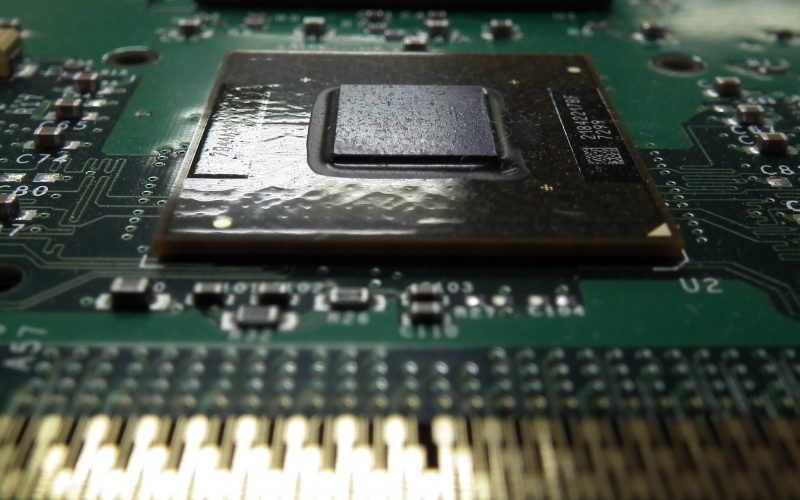
Staff Photo by Blair Jackson: Motherboards and their chips are often disassembled unsafely in order to access trace amounts of gold and silver.
Inside the Free Geek center, there seems to be no rhyme or reason to the stacks of computer monitors, dusty televisions and computer towers that crowd the space. Cardboard boxes full of keyboards and motherboards are interspersed throughout the hallways, perhaps on top of a tower that has been stripped down to its skeleton.
But there is method to the madness.
Justin Doile, one of the lead volunteers of the organization, explains that one side of the room is reserved for recyclable or reusable materials, while the other is reserved for items that could be disassembled and used for parts.
To the untrained eye, it may all look like junk. The volunteers at Free Geek see unlimited possibilities in the constant supply of hardware and raw materials. A dual-screened monitor with touch-screen technology and a 3-D printer large enough to replicate an automobile part are two current Free Geek projects.
The local branch of Free Geek is modeled after the Free Geek in Portland. Both facilities share the same mission: To recycle technology and provide access to computers, the Internet, education and job skills in exchange for community service.
Free Geek Arkansas is open three times a week — Monday, Wednesday and Saturday — from noon to 6 p.m.
Free Geek accepts old electronic devices and computers, which are often stored in garages, barns or storage sheds.
Robyn Reed, director of the Washington County Environmental Affairs Office, speculates that many people are still unaware of how to properly dispose of electronics.
“People know they’re not supposed to go in a landfill, but they’re not quite sure what to do with them. I think that’s why we keep getting so much of it,” says Reed. The Household Hazardous Waste Department collected 82 tons of e-waste in 2011, not including additional e-waste collected during free special events.
Electronic waste encompasses a broad range of electronics, ranging from large household appliances to hand-held devices. The U.S. is the world leader in producing e-waste, dumping between 300 million and 400 million electronic items per year. According to a 2009 EPA report, only 25 percent of that e-waste is recycled. Organizations such as HHW and Free Geek are working to change that.
So how much e-waste is stored in the closets of Northwest Arkansas? Once a year, a number of organizations come together to offer free electronic recycling for a limited time. In 2011, HHW reported that 24 semi-trailers were filled with e-waste.
Though some people may keep their unused electronics in storage, others dispose of them improperly in illegal dumpsites. Electronics include a number of hazardous materials, including cadmium, lead, zinc and mercury. When these items are disposed of improperly, whether in illegal dumpsites or open landfills, there is risk of exposing water sources to the toxins created by these components.
Reed says the greatest example of electronics threatening a water source occurred two years ago on the bank of the Illinois River near Hogeye. There, she and her crew discovered 20,000 pounds of discarded electronics. They worked after hours, despite an oncoming storm, to clean up the site.
The environmental hazard of e-waste has global implications as well. With the rise of the technology industry came an onslaught of new products that were quickly replaced by newer technology. This consumer trend is a major creator of e-waste. Today, a majority of the e-waste produced by the U.S. is exported to countries such as China, India and Kenya, where lower environmental standards and working conditions make processing e-waste profitable.
Hazardous methods are used to break down the precious metals found in computers, and workers in these countries are unprotected by environmental standards or labor regulations.
“It takes hot sulfuric acid to melt the ceramic,” says Justin. “It’s the nastiest stuff you could imagine.”
Though China has banned e-waste, it remains one of the largest dumping grounds for discarded electronics. In the Guangdong province, in the rice-producing town of Guiyu, rice is no longer grown because the land is no longer capable of producing crops. Nicknamed “the electronic graveyard,” Guiyu receives a majority of the 100 million tons of e-waste that is estimated to be sent to China each year.
[youtube]http://www.youtube.com/watch?v=ZHTWRYXy2gE&feature=related[/youtube]
Here e-waste is disassembled for its valuable metals. Rivers, polluted with heavy metals, run red. Lead poisoning and cancer are common health problems. This process follows the path of lowest cost and lowest standards. The result is disastrous both to environmental welfare and public health.
Because some U.S. companies will illegally ship electronics to China and other nations with lax regulations, a demand has arisen for environmentally responsible recyclers of electronics.
Enter the e-steward.
E-stewards such as eSCO in Rogers follow a number of guidelines to ensure that e-waste is recycled or disposed of responsibly. Accountability, safety and transparency make e-stewards the go-to recycling source for both HHW and Free Geek.

Staff Photo by Blair Jackson: A Free Geek volunteer carries an outdated computer to an Esco trailer truck. Esco, an e-steward, will recycle or dispose of the materials safely.
On recycling day at Free Geek, volunteers, ranging in age from 10 to 80, carry electronic equipment to the curb for the e-steward. Todd Stange, an eSCO employee, explains that items are organized based on materials. There are the common ones, such as metal, steel and aluminum; but there is a different category for the motherboards, which have to be grouped together for their special metal properties. The parts will all be sent to be recycled, and hopefully to find a new life in a new piece of technology one day.
In addition to recycling, Free Geek volunteers give new life to products by refurbishing older models of technology. The thrift store offers used products from $125 to $150. The refurbished computers have the capabilities of modern computers, but because of systematic obsolescence, none of the computers run Windows as an operating system.
Systematic obsolescence is a term used to describe a unique scenario in which the hardware of a computer is functional, perhaps even on par with modern standards, but is forced into obsolescence because an operating system is created to be incompatible with older models.
Microsoft Windows is a prime example of a product that creates obsolescence. When a new version of Windows comes out, it is created to be incompatible with older hardware, making it necessary to either use a different operating system or upgrade the computer.
The refurbished computers available at Free Geek do not run Microsoft Windows. Instead, they use the free Linux-based Ubuntu software operating system. In part, the software was chosen because of its long-term support; but it was also chosen to support the idea that money should not serve as a barrier to technology. Free Geek offers tutorials for those who need help adjusting to the new operating system, but unlike a tech-help team, Free Geek will not fix any problems on any personal electronics or computers.
Free Geek volunteers will, however, be happy to teach people to solve their own problems.
To explain this principle, Justin references the Chinese Proverb, “Give a man a fish and you feed him for a day. Teach a man to fish and you feed him for a lifetime.”
For Justin, volunteering at Free Geek is about helping people. As a former member of the technology industry, he has witnessed the growing separation between individuals and the technology used in everyday life. This lack of knowledge forces consumers to depend on corporations for repairs, troubleshooting and customer support.
Obsolescence is a major contributing factor to e-waste. The average lifespan of a personal computer is only two years, and the high rotation of products creates an enormous amount of waste, estimated at 3 million tons per year in the U.S. alone.
An electronic device can be rendered obsolete for a number of reasons — when the tech-team can no longer help; or the costs of repair become too high; or the hardware becomes incompatible with more-recent technology; or when the newer model is simply trendier — and for each obsolete item there is one more piece of e-waste that will find its way to a landfill, foreign country or recycling facility.
It’s energy efficient to rebuild old computers, but only about 2 percent of PCs ever find their way to a second

Staff Photo by Blair Jackson: Justin Doile, far left, talks to fellow volunteers in the Free Geek computer lab as the 3-D printer creates a herringbone gear.
user. At Free Geek, parts are used in a variety of projects. The crew has developed a small 3-D printer from components found in the Free Geek donations. There are only 10,000 3-D printers in the world. Using biodegradable plastic made from corn, the printer can produce any plastic object within its printing diameters. The remarkable thing about the Free Geek printer is that it produces its own parts.
“We encourage creativity here,” says Valerie Doile, who wears dual hats as the receptionist and clerk of the thrift store. While Valerie sits at the front desk, other volunteers build computers, repair electronics, organize the storage room or dismantle parts.
Everyone has his or her own personal project, whether it’s sweeping up all the loose bolts from the carpet or building a robot. Regardless of the task, the staff at Free Geek is working to empower the general public by offering them an education on the ever-evolving technological world.










